Sunshine Worldwide School is an International Baccalaureate Primary Years Programme IB authorized World School and is due for authorization in 2020
- IB PYP –The IB Primary Years Programme (PYP) for children aged 3 – 12 nurtures and develops young students as caring, active participants in a lifelong journey of learning.
- CBSE – A progressive central board with its prime focus being innovation in teaching learning and methodologies.
- Trained and motivated educators – A well-trained team capable of delivering the stringent standards of both curriculums.
- Pedagogy – An unique approaches to learning involving research, inquiry, action and reflection.
What is an IB education?
The PYP offers an inquiry-based, transdisciplinary curriculum framework that builds conceptual understanding. It is a student-centered approach to education for children aged 3-12. It reflects the best of educational research, thought leadership and experience derived from IB World Schools.
The PYP has evolved to become a world leader in future-focused education. The PYP is an example of best educational practice globally, responding to the challenges and opportunities facing young students in our rapidly changing world.
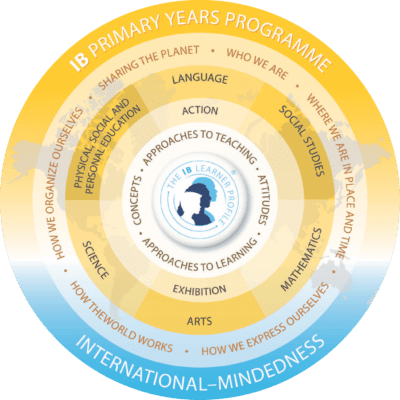
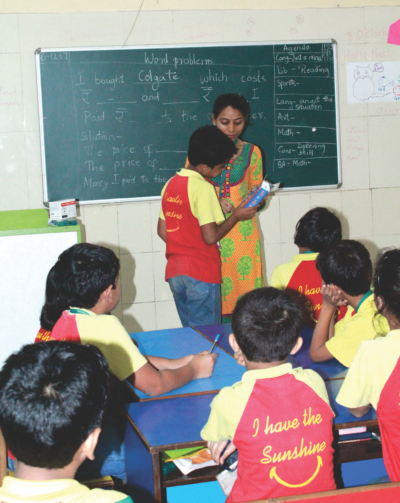
The IB offers high-quality programmes of international education that share a powerful vision. Informed by the values described in the learner proile, an IB education:
- Focuses on learners – the IB’s student-centered programmes promote healthy relationships, ethical responsibility and personal challenge
- Develops effective approaches to teaching and learning – IB programmes help students to develop the attitudes and skills they need for both academic and personal success
- Works within global contexts – IB programmes increase understanding of languages and cultures, and explore globally signiicant ideas and issues
- Explores significant content – IB programmes offer a curriculum that is broad and balanced, conceptual and connected. IB learners strive to become inquirers, knowledgeable, thinkers, communicators, principled, open-minded, caring, risk-takers, balanced, and reflective. These attributes represent a broad range of human capacities and responsibilities that go beyond intellectual development and academic success.
What is the IB Primary Years Programme (PYP)?
The PYP curriculum framework begins with the premise that students are agents of their own learning and partners in the learning process. It prioritizes people and their relationships to build a strong learning community. PYP students use their initiative to take responsibility and ownership of their learning. By learning through inquiry and reflecting on their own learning, PYP students develop knowledge, conceptual understandings, skills and the attributes of the IB Learner profile to make a difference in their own lives, their communities, and beyond. The framework emphasizes the central principle of agency, which underpins the three pillars of school life:- The learner
- Learning and Teaching
- The Learning community.
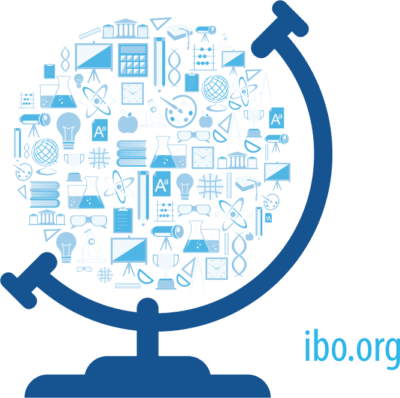
The IB Primary Years Programme
- Addresses students academic, social and emotional well-being
- Encourages students to develop independence and to take responsibility for their own learning
- Supports students’ efforts to gain understanding of the world and to function comfortably within it
- Helps students establish personal values as a foundation upon which international-mindedness will develop and flourish.
The six subject areas identified within the IB Primary Years Programme:
- Language
- Social studies
- Mathematics
- Arts
- Science
- Personal, social and physical education
The most significant and distinctive feature of the IB Primary Years Programme are the six transdisciplinary themes. These themes provide IB World Schools with the opportunity to incorporate local and global issues into the curriculum and effectively allow students to “step up” beyond the confines of learning within subject areas.
Why offer the PYP?
The PYP focuses on the development of the whole child as an inquirer, both in school and in the world beyond. The PYP offers a transformative experience for students, teachers and whole school communities and delivers excellent outcomes by providing an education that is engaging, relevant, challenging and significant. PYP learners know how to take ownership of their learning, collaborating with teachers to deepen understanding and increase their confidence and self-motivation. Through actively engaging in integrated ongoing assessment they become effective, self-regulated learners who can act on constructive feedback. Guided by six transdisciplinary themes of global significance, students broaden their learning by developing their conceptual understandings, strengthening their knowledge and skills across, between and beyond subject areas.The Six Transdisciplinary Themes Of IB- PYP authorized World School Programme
-
- Who we are
-
- Where we are in place and time
-
- How we express ourselves
-
- How the world works
-
- How we organize ourselves
-
- Sharing the planet
Parent Pack
IB’s Mission and Philosophy
At the centre of an International Baccalaureate (IB) education are students aged 3 to 19 with unique learning styles, strengths and challenges. The IB focuses on each student as a whole person. Thus, IB programmes address not only cognitive development but social, emotional and physical well-being. The aim is to develop inquiring, knowledgeable and caring young people with adaptable skills to tackle society’s complex challenges and who will help to make it a better, more peaceful world. Validating the ecacy of the IB’s four programmes are research and more than 45 years of practical experience. IB programmes emphasize learning how to learn and teaching students to value learning as an essential, integral part of their everyday lives. The IB promotes the development of schools that:- inspire students to ask questions, pursue personal aspirations, set challenging goals and develop the persistence to achieve those goals
- develop knowledgeable students who make reasoned ethical judgments and acquire the flexibility, perseverance and confidence they need in order to bring about meaningful change
- encourage healthy relationships, individual and shared responsibility and effective teamwork.
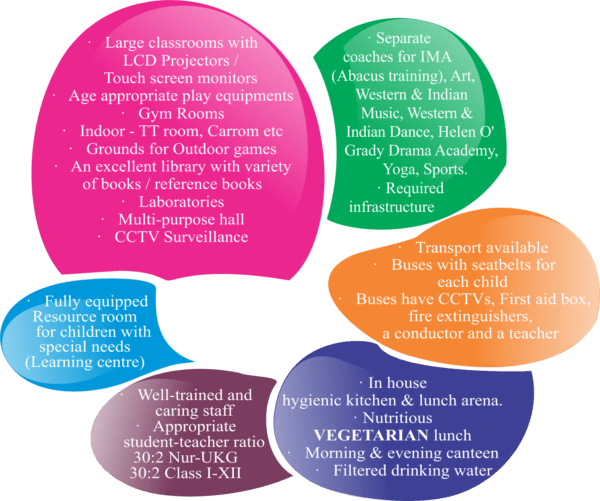
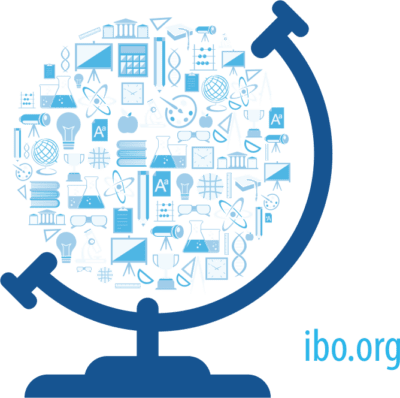
What is an IB Education?
The IB’s four programmes In the Primary Years Programme (PYP), the IB’s youngest students learn about and use knowledge, concepts and skills from a variety of subjects to explore six transdisciplinary themes and begin to develop the attributes of the learner profile . The Middle Years Programme (MYP) is a challenging framework that encourages students to make practical connections between their studies and the real world and culminates in a personal project. Students who complete the MYP are well-pre pared to undertake the IB Diploma Programme.
In the final two years of high school, students can choose to enter either:
- The Diploma Programme (DP), a curriculum which emphasise both breadth and depth of knowledge. The DP is made up of six subject groups and a core, comprising theory of knowledge (TOK), creativity, activity, service (CAS) and are search paper of up to 4,000 words, the extended essay (EE);
- The Career-related Programme (CP) The CP is combines two IB diploma courses with school-based, career-related study. It equips students to pursue further education or to enter their chosen career path immediately.
